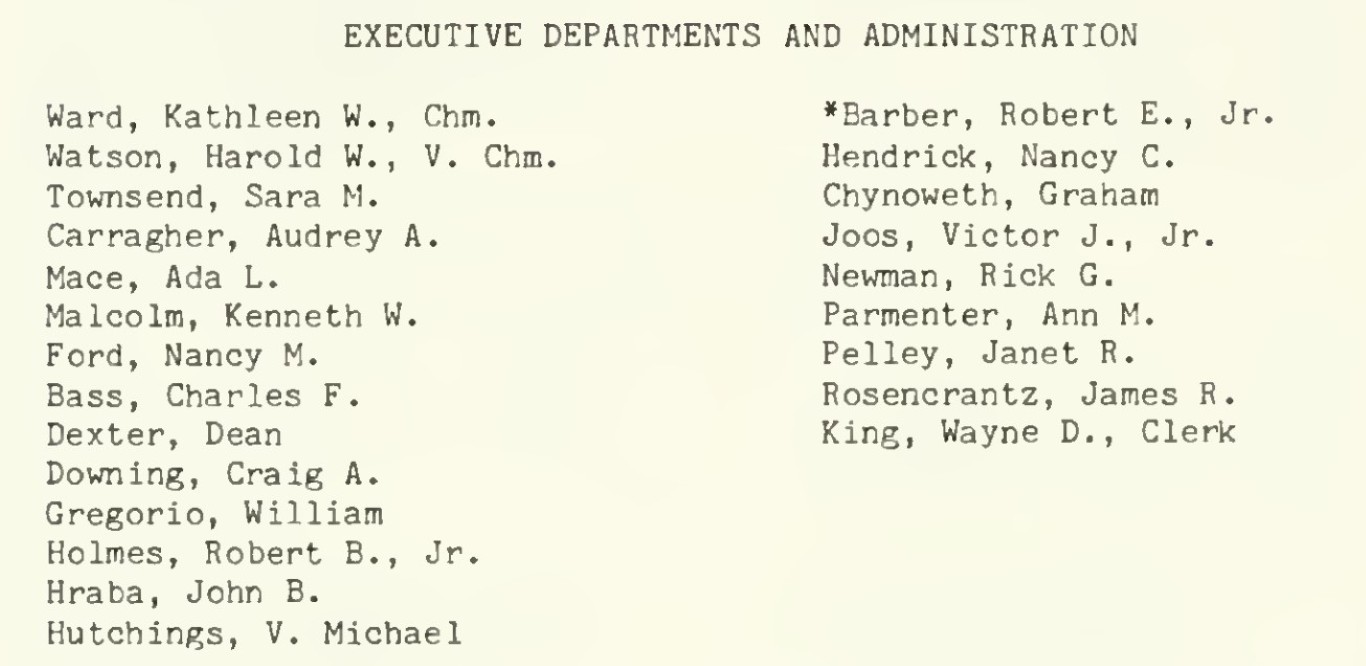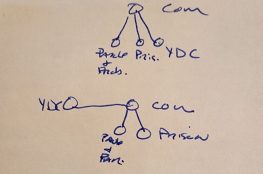ED&A Committee Members in 1983
May 3, 1983
We held committee hearings today on several housekeeping measures. Overall, nothing spectacular happened today.
May 4, 1983
This morning the Majority Leader, Bruce Rounds, called me into his office to present the Party's position on creating a youth caucus. They are adamantly opposed to the idea. Their contention: factional politics is bad for the Party. Maybe it is. Then again, maybe they are remiss in viewing our effort as a factional undertaking. I feel compelled to find out what the consensus is on various issues that affect people of my age. I want to confront those issues head-on.
Unfortunately, the leadership on both sides of the fence are opposed for the same reasons. It is my firmly held belief that the more vigorously they oppose us the more they show their fear of losing control of us. They fear our movement, because we may become successful as a voting bloc. They may be correct. We may cause a schism, of sorts, between the younger and the older members of the House.
Our purpose isn't to be divisive. If the leadership is smart, they will sit back and let things fizzle out of their own accord. It is inevitable that the caucus will find itself feeding on its own energy as divisive issues are considered. The result will be the dissolution of the caucus. Our aim, at least, is to make a statement. If we can stimulate an honest debate about issues that face younger citizens, maybe we can transfer some of the energy we generate into some positive actions.
If the leadership puts their mind to it, they will blow us out of the water. Unfortunately, they are approaching this in such a way that there is no back door in sight for me to use to save face. If they spent a little time, and called all the young Republicans, to steer them away from showing up Thursday May 5, 1983. Then I could back off, because there would no Republicans there, only Democrats. And if no Republicans show up, then I will not participate.
My belief is that the caucus must be bipartisan. If it turns out to be purely a young Democratic caucus, then I cannot participate, because it would destroy my budding political career. But if they back me into a corner, I will come out fighting. At this juncture, I wish I could find a way to save face and fire up leadership at the same time. I doubt, however, that they are interested in giving me an opportunity to gently back off. It is not in their best interest to do so. They have played their hardline option first. It becomes a matter of them saving face by showing that they have the power to crush me.
As an aside, it was interesting that the arguments used against factionalism were strikingly similar to Stalin's pronouncements on Trotskyism. I guess there is no ideological difference between the capitalists and the communists when it comes to intra-party factionalism. There can be no honorable opposition within the Party. At least there can be no formalized opposition. To add injury to insult, we have directed this assault at both parties. Therefor it appears, on the surface, to be an attempt to attack the two-party system head-on. If leadership only pondered for a moment, they would realize that it is absurd that we want to undermine the two-party system. History has clearly shown the strength of the two-party system. For better or for worse.
Frankly, I support the two-party system. I do not believe in coalition governments. It scares me to think that a minority can dictate policy to a clear majority on issues dividing the political community.
May 9, 1983
Leadership could easily use the youth caucus to help legitimize some of the decisions around here. But... it will not be. Not this time. Only twelve people showed up; three of those were spies. One Rep. jotted down everyone's names and kept notes, ascribing and associating names with the various political themes. Either the body felt no clear need to form a caucus, or, in my opinion, leadership stalled things. Clearly, we were unsuccessful.
We were left with nine people, minus Wayne King and me. That left seven. Of which, one member wants to relive the 1960's. That leaves six. We have no option but to back down, now. We will take it like a couple of troopers. I believe the sooner we forget our stillborn effort, the sooner we can get onto identifying different strategies to get what we want. The consensus among the group was to meet socially.
I think we should retreat to our former game plan - stick with what is working. Then move again. Only, next time, do it right. We will have to wait until the down time to plan. If we find an issue, something attractive to a majority of the potential youth caucus, then we should pull something off next term. My only fear is that things could quickly digress to leave the two of us, Wayne King and myself, as quasi-pariahs. Which is not wholly a bad thing. Considering our age, we could have decades to forge ahead. Next time I will have planned it properly.
I will probably do it for another candidate, though. I do not like doing all the "candidate" sorts of things. For example, Wayne King likes politicking back in the district. I prefer to be in Concord. If I held higher office I would be forced to play the home-front properly. I would rather organize events for someone else. I do not want to live in a fishbowl. I would rather work behind the scenes. I believe I would be much more effective working in the hallways and corridors of government. That is where the real action is taking place.
Elected officials must pay their home-front dues. As it should be. It is correct and vitally important to the success of the political system. I just do not enjoy the campaign experience. That is, as the candidate. Besides, one can be more mercenary if one abstains from being a candidate. Candidates come and go, but the political army remains intact and in the field.
A final journal entry for the purpose of satisfying my contract with Dr. Egbert is in order.
It looks like you were right, Dr. Egbert. Back in January you stated that reorganization would not, in fact, occur. It appears at this juncture that reorganization at the House level is purely an academic exercise.
All the time and effort devoted to proposing different government structural solutions, diving deep into the rational for government agencies and their functions, approached from various philosophical perspectives, was for naught. Every piece of legislation dealing with reorganization has fallen into a Senatorial void. Not one bill has been voted out yet. The atmosphere is jaundiced by the meddling of the Chief Executive. But I am getting a little ahead of myself.
The session began with a bang. Though many times removed from leadership, I was not hampered by being on the outside. My isolation was expected. My freshman status in the body gives me virtually no political capital and no allies to rally. Though irreverent at first, I soon began to appreciate some of the tradition. I find ceremony to be a way to kill two birds with one stone. First, it tends to legitimize the output. Second, it serves to keep tempers controlled by containing them within the operators of the formal legislative process. Strict adherence to the parliamentary game plan allows both sides ample opportunity to get even. Several times I witnessed legislation that was pushed through or stalled by the appropriate motion at the proper time.
In addition, some motions from the floor can provide comic relief. Frequently, a representative will ask a parliamentary question along the following lines: "Mr. Speaker... If I hate little children, am against public education, and may have a member of my family in the John Birch Society, will I vote yes on the question?" In this instance the Speaker responded, "Representative Daniele, if you are all of the aforementioned, I suggest that you abstain?” It brought the House down. Especially given the tense atmosphere created by the bill being considered and the contentious floor debate that ensued.
At times these parliamentary games can be annoying. But the thing that really bothers me is being misled. Or, frankly, the thing that unnerves me most are the flat out lies. We are lied to about the deficit situation. We are lied to regarding the revenue raising capability of the Uniform Business Tax (UBT). We are lied to about the "carrot" of the carrot and stick: the Supplemental Budget. Of course, it leads one to wonder how much of the result is due to our own individual negligence and our desire to justify going along with leadership’s program. Some of us went along to satisfy our own private agendas. Mostly though, we just bought the program hook, line, and sinker.
My presentation of these conclusions does not mean this has been a negative experience for me. On the contrary, overall, my experience has been very rewarding. I fell in love with the "action.” The combined experience of sponsoring and following through on legislation has been an education in and of itself. Learning how to barter using abstractions as currency has allowed me to sharpen my bargaining skills. Contributing constructively to the free flow of debate without being divisive is a talent I did not possess before going to Concord. I feel very positive about acquiring this new skill at this point in my life.
One experience that I believe impacts me the most, much to my surprise, is the newfound ability to put an issue behind me, win or lose. If one allows a single issue or event to dominate their life, then one is doomed. Witness the champions of the Bottle Bill. They went into a deep depressive tailspin after the word came from the Senate regarding the fate of their baby: committed to Interim Study. They were devastated by the news. Had other battles registered on their radar, something to devote their energy towards, then the ride down would not have been so hard and fast. They had nothing to pick themselves up for, something to reward themselves for all the effort, for all the time they spent in Concord. Unfortunately, for many of them, that was not the case.
Working on the Committee has two advantages. The foremost is the potential to steer the whole process by engaging in dialectical deliberations. One can have an impact, even if it turns out to have been merely academic, on some important pieces of legislation. Secondly, no matter how politically diverse, a committee can form strong personal relationships between its opposing members. For the most part the members on our committee are representative of the whole legislative body. Most of us, regardless of our political stripes, are committed to doing the right thing. We recognize the importance of compromise, but sense when to be intransigent. One can only give up so much to strike a deal.
One skill I did not come away with is patience. In fact, it is one of my greatest deficits. Yet, patience can be a liability, too. I only have so much time to play power broker. Patience is not a virtue given the short legislative session. But sometimes, I need to remember that the short legislative term is just that: one short term with many sessions to follow. The effort on anything worth accomplishing may take generations. I still have plenty of time. If for some reason I cannot stop myself, I know the world does not come to an end on May 21,1983; but it sometimes appears like it will. They tell me that I’ll be mellow with age.
Just like the man from Freedom, MO, said, "Show me!"
May 18, 1983
Yesterday, we finally put the Inter-state banking bill to rest. This single issue was the most heavily lobbied bill in the history of the Legislature. Individual Reps were offered inducements, both positive and negative, to vote one way or the other. For example, one Rep. was offered a gold plated VISA card, another a job, and yet another was threatened with his job. Reps received late night phone calls and more mail than one has ever received regarding a single issue. The merits of the bill were clouded by the effort to pass or defeat it.
The advocates for interstate banking made some effective arguments as did those who opposed the bill. In the long run, this state will eventually adopt interstate banking. Only, hopefully, after watching events unfold in the other states that have already opened their doors to out-of-state banks. My argument against the current bill centers around the present international confusion regarding the practices of the banking industry.
To maximize the rate of return on their money, they are accustomed to moving money around overseas, and with interstate banking they will make funds move around the continental United States. Unfortunately, when the international situation ameliorates, they will redirect their financial energies towards the world market. Presently, the big banks are 40% invested overseas. This figure may not change much as a percentage of their total holdings, but the dollar amount will increase significantly.
On the domestic front, small borrowers will be pushed out of the market, because for the big banks, it costs them more to service the loans than they can realize in accrued interest. In addition, when a local borrower is turned down by a bank for a loan, the applicant must deal with decision makers in New York or Los Angeles to change the decision. Most of us are very leery of investing even more in these financial centers. The fight is not over yet. The banks will not give it up until they win or until the international situation clears up and the issue becomes moot.
On Saturday, May 14, Wayne King and I exposed ourselves to the wrath of our respective constituencies. After a media promotional plug, where we challenged each other to participate in a fund-raising event, we found ourselves in a specially constructed booth for the purpose of having wet sponges thrown at us for a small fee. The money we raised goes towards a memorial fund for a young man who died in a tragic traffic accident in 1982. The High School is using funds raised from other events to purchase a piece of diesel equipment for the Votech Center. The event was a lot of fun. We raised about $75.00 and had well over 200 sponges tossed at us.
May 24, 1983
Finally!!! Graduation is over. My ten-year quest for the holy grail has come to an end. The ED&A committee presented a very nice card and a Candy Kiss to me. Unfortunately, it all seems a bit anti-climactic. On the one hand I feel as though I have reached the end of one road, yet I have no time to enjoy it. I refuse to allow myself the luxury of enjoying this period of my life, because I feel the extreme downward pressure of immediately finding gainful employment.
May 30, 1983
This past week we passed a very important piece of legislation that will have a dramatic impact on Clinical Social Workers. This bill will allow third party payments to Clinical Social Workers who have demonstrated that they have successfully satisfied their certification process. The hardliners on the Committee were very much opposed to this legislation, because of their bias towards the mental health profession. In the end, a few of them changed their minds to vote for the bill as amended. However, When the bill makes its way to the floor of the House, I am quite sure they will change their vote to reflect their deep-seated opposition towards this type of legislation.
There is a lot of dissension building on the ED&A committee. Madame Chair is attempting to purge the committee of what she characterizes as disloyal members. Her methods are quite tactless. She certainly is making more enemies than friends when she carries out her assaults against some of us, the so called, guilty parties. She forgets that we have decades ahead of us, and she does not have the luxury of building new alliances.



